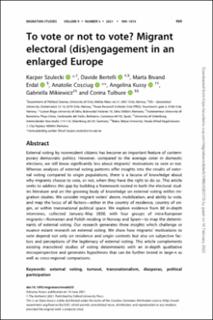| dc.contributor.author | Szulecki, Kacper | |
| dc.contributor.author | Erdal, Marta Bivand | |
| dc.contributor.author | Bertelli, Davide | |
| dc.contributor.author | Cosciug, Anatolie | |
| dc.contributor.author | Kussy, Angelina | |
| dc.contributor.author | Mikiewicz, Gabriella | |
| dc.contributor.author | Tulbure, Corina | |
| dc.date.accessioned | 2022-02-22T08:52:08Z | |
| dc.date.available | 2022-02-22T08:52:08Z | |
| dc.date.created | 2021-06-22T16:10:52Z | |
| dc.date.issued | 2021 | |
| dc.identifier.citation | Migration Studies. 2021, 9 (3), 989–1010 | en_US |
| dc.identifier.issn | 2049-5838 | |
| dc.identifier.uri | https://hdl.handle.net/11250/2980696 | |
| dc.description | This is an Open Access article distributed under the terms of the Creative Commons Attribution License (http://creativecommons.org/licenses/by/4.0/), which permits unrestricted reuse, distribution, and reproduction in any medium, provided the original work is properly cited. | en_US |
| dc.description.abstract | External voting by nonresident citizens has become an important feature of contemporary democratic politics. However, compared to the average voter in domestic elections, we still know significantly less about migrants’ motivations to vote or not. Whereas analyses of external voting patterns offer insights into the results of external voting compared to origin populations, there is a lacuna of knowledge about why migrants choose to vote, or not, when they have the right to do so. This article seeks to address this gap by building a framework rooted in both the electoral studies literature and on the growing body of knowledge on external voting within migration studies. We consider migrant voters’ desire, mobilization, and ability to vote, and map the locus of all factors—either in the country of residence, country of origin, or within transnational political space. We explore evidence from 80 in-depth interviews, collected January–May 2020, with four groups of intra-European migrants—Romanian and Polish residing in Norway and Spain—to map the determinants of external voting. Our research generates three insights which challenge or nuance extant research on external voting. We show how migrants’ motivations to vote depend not only on residence and origin contexts but also on subjective factors and perceptions of the legitimacy of external voting. This article complements existing macrolevel studies of voting determinants with an in-depth qualitative microperspective and generates hypotheses that can be further tested in large-n as well as cross-regional comparisons. | en_US |
| dc.language.iso | eng | en_US |
| dc.publisher | Oxford University Press | en_US |
| dc.rights | Navngivelse 4.0 Internasjonal | * |
| dc.rights.uri | http://creativecommons.org/licenses/by/4.0/deed.no | * |
| dc.subject | political participation | en_US |
| dc.subject | diaspora | en_US |
| dc.subject | transnationalism | en_US |
| dc.subject | turnout | en_US |
| dc.subject | external voting | en_US |
| dc.title | To vote or not to vote? Migrant electoral (dis)engagement in an enlarged Europe | en_US |
| dc.type | Peer reviewed | en_US |
| dc.type | Journal article | en_US |
| dc.description.version | publishedVersion | en_US |
| dc.rights.holder | © The Author(s) 2021. Published by Oxford University Press | en_US |
| dc.source.pagenumber | 989–1010 | en_US |
| dc.source.volume | 9 | en_US |
| dc.source.journal | Migration Studies | en_US |
| dc.source.issue | 3 | en_US |
| dc.identifier.doi | 10.1093/migration/mnab025 | |
| dc.identifier.cristin | 1917786 | |
| dc.relation.project | Norges forskningsråd: 287738 | en_US |
| cristin.ispublished | true | |
| cristin.fulltext | original | |
| cristin.qualitycode | 1 | |

